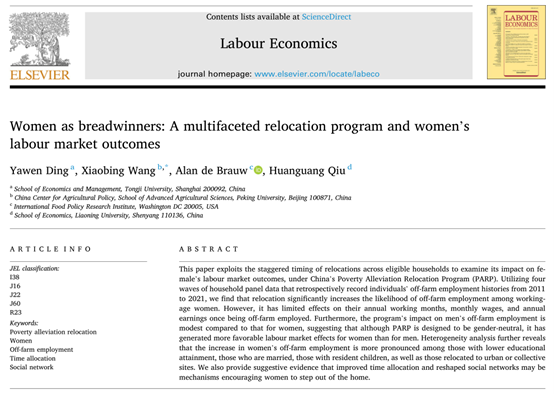current location: Home> Central News
Central News
The research group led by Xiaobing Wang published a paper in Labour Economics.
Release date:2025/09/05 Source: CCAP
Recently, Professor Xiaobing Wang from the School of Advanced Agricultural Sciences and the China Center for Agricultural Policy at Peking University, together with collaborators, published an article in Labour Economics, the flagship journal of the European Association of Labour Economists. The study systematically evaluates the impact of the “13th Five-Year Plan” Relocation for Poverty Alleviation program on the labor market outcomes of relocated women.
The paper, entitled “Women as breadwinners: A multifaceted relocation program and women’s labour market outcomes”, is co-authored by Yawen Ding (first author, 2024 Ph.D. graduate of the School of Advanced Agricultural Sciences and currently Assistant Research Fellow at the School of Economics and Management, Tongji University), Professor Huanguang Qiu of Liaoning University, and Dr. Alan de Brauw, Senior Research Fellow at the International Food Policy Research Institute.

The 13th Five-Year Plan Relocation for Poverty Alleviation program has played a significant role in helping resettled households escape poverty traps and achieve developmental empowerment. However, existing studies have mainly focused on the program’s effects on household income growth and livelihood transformation, with relatively little attention paid to gender-based heterogeneity in post-relocation employment.
Based on longitudinal panel data from resettled households in 16 counties across 8 provinces, this study constructs an 11-year dataset (2011–2021) of individual non-farm employment outcomes. Using a staggered difference-in-differences model, it identifies the causal effects of relocation on women’s labor market performance.
The findings show that relocation significantly increased women’s participation in non-farm employment, the number of months worked per year, and annual income. However, among women who were already engaged in non-farm work, the effects on working time and income were limited—indicating that the main policy impact lies on the “extensive margin.” Compared with men, relocation had a stronger positive impact on women’s non-farm employment, suggesting that this ostensibly gender-neutral poverty alleviation policy has, in practice, created greater opportunities for women’s economic empowerment.
Heterogeneity analysis reveals that women with lower levels of education, those who are married, and those with children benefited the most. Mechanism analysis further shows that improved housing conditions and reconstructed social networks brought about by relocation significantly reshaped women’s time allocation, broadened their non-farm employment opportunities, and especially increased their likelihood of engaging in casual or gig work.
Understanding gender heterogeneity in post-relocation employment is crucial for promoting high-quality employment among resettled households and ensuring effective alignment between poverty alleviation achievements and rural revitalization. This paper provides important empirical evidence on the gender-differentiated effects of a major poverty reduction program in China, while also offering valuable insights and models for global poverty reduction practices.
This research was supported by the Major Program of the National Social Science Foundation of China, Special Program of the National Natural Science Foundation of China (NSFC), NSFC General Program, and NSFC Young Scholars Program (Category C).
Citation:
Yawen Ding, Xiaobing Wang, Alan de Brauw, Huanguang Qiu. 2025. Women as breadwinners: A multifaceted relocation program and women’s labour market outcomes. Labour Economics, 102784.



 Home
Home



